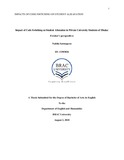Impact of code switching on student alienation in private university students of Dhaka: fresher’s perspectives

View/
Date
2018-08Publisher
BRAC UniversityAuthor
Sarmageen, NabilaMetadata
Show full item recordAbstract
“Code switching” is a common occurring phenomenon in Bangladesh. , especially in Dhaka. Although most of the Private Universities instructs to follow EMI policy, using L1 in classroom has become pretty conventional scenario now. Student alienation is another common issue that is experienced by Private University students, especially freshers .Countries like Bangladesh where English is considered as a foreign language to be taught and learned “switching codes in classroom” is a very noticeable and significant factor which cannot be ignored anymore. Many research works and surveys are done around the world and in Bangladesh also to find out the reasons, benefits, disadvantages, techniques and strategies, etc. of code switching. This paper aims to find out impact of code switching on student alienation by Private Universities freshers in Dhaka. Additional findings of the paper include a comparative analysis of the impacts of code switching on student alienation between Bengali and English medium students. A quantitative and a qualitative survey was conducted for data collection procedure where 100 freshers from 10 different Private universities of Dhaka have participated. Data collection process is conducted through online and face to face interview session. Data analysis process is measured using average mean systems and Dean Alienation Scale and the interpretation scale of Seligar and Shohamy(1989) .The findings of the survey result in showing the overall impacts of code switching on student alienation, regarding factors, measures of student alienation in various subscales and effects of it. The paper intends to find out whether code switching has positive or negative impacts on student alienation and how it affects Private University freshers from Bengali and English medium backgrounds.
Description
This thesis is submitted in partial fulfillment of the requirements for the degree of Bachelor of Arts in English, 2018.Department
Department of English and Humanities, BRAC UniversityType
ThesisCollections
- Thesis, B.A. (English) [647]
